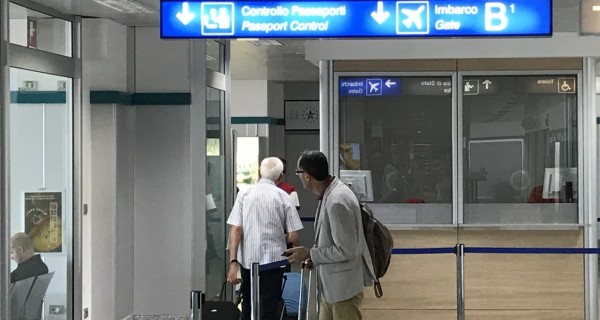Return decision, SIS alert and their implications

As from 7 March 2023, the Dutch Immigration Service (IND) has adopted a new policy on return decision ("terugkeerbesluit"). Since its implementation, law enforcement authorities interpret the new policy differently. This article explains the issue as to how a return decision can affect your (future) travel to the Schengen Area.
What is a return decision?
The name is self-explanatory. A return decision requests a third country national (ie. a non-EU citizen) to leave the entire EU and the EEA.
In the Netherlands, there are various governmental agencies that have the statutory power to issue a return decision. They are namely the IND, the Alien Police, the Ferry Port Police (Zeehavenpolitie) and the Royal Border Police (Koninklijk Marechaussee). Generally, there are two types of return decisions: one requests a foreigner to leave the Netherlands and the EU voluntarily within a specific time limit (usually 28 days) after the issuance of a return decision; and the other requires a foreigner to leave the aforementioned territories immediately without further delay. It is important to note that a return decision is different from an entry ban (inreisverbod). The latter prohibits a foreigner from re-entering the entire Schengen Area for a designated period.
Starting from 7 March 2023, according to the new IND policy, a return decision will be registered in the Schengen Information System (SIS) as an “alert on return”. This SIS system is a common system shared by the Schengen Member States. If your name is recorded in the SIS, the SIS will generate an alert when you attempt to cross the external border. An SIS alert will hinder one’s travels immensely.
When does a foreigner receive a return decision?
There are several situations in which a foreigner can receive a return decision:
1) The IND declines your residence permit application;
2) The IND revokes your residence permit;
3) The Royal Border Police finds that one has overstayed their visa when one tries to leave the Schengen Zone via Amsterdam Schiphol airport;
4) The Alien Police finds that one is staying illegally inside the Netherlands.
Please find below several real experiences that our clients encountered:
A client was abroad when the IND revoked his residence permit
David is an international student from Australia. He came to the Netherlands to participate in an exchange program, and he held a Dutch student visa. When his exchange program ended, his school notified the IND. As a result, the IND revoked David’s residence permit. At that time, David was traveling in Turkey, and he was not aware of the fact that the IND revoked his residence permit. When David attempted to enter Greece, he was detained, interrogated and threatened by the Greek border police. Eventually, David was sent back to Turkey. It turns out that, when the IND revoked David’s residence permit, the IND issued a return decision. The return decision was registered as an alert in the SIS. When David attempted to enter Greece, the Greek border police noticed the SIS alert. After weeks of communication between our firm and the IND, the IND removed the return decision. David flew safely back to the Netherlands.
During a pending administrative review procedure, re-entry was denied
Beau is a British citizen. He applied for a self-employment visa in the Netherlands, but his application was declined by the IND. The IND issued a return decision, which got registered as an alert in the Schengen Information System. Beau filed an administrative review petition (“bezwaar”). Pursuant to section 8 of the Dutch Immigration Act, Beau had legal stay in the Netherlands during the administrative review period. As British citizens are normally exempted from entry visa requirement, Beau went on a business trip outside the Netherlands without asking for a return visa (“terugkeervisum”). A few weeks later, when Beau landed at the Amsterdam Schiphol airport, he was denied entry and sent back to his country of nationality. Again, after weeks of hard work, the IND removed the return decision and Beau managed to return to the Netherlands successfully.
Re-entering the Netherlands with a return visa
Anne is a highly skilled immigrant from a country in Africa. She submitted a new application, and she got a return visa for the purpose of returning to her country briefly. During her stay in Africa, the IND declined her application and gave her a return decision (which got registered as an alert inside the SIS). Originally, Anne was planning to re-enter the Schengen Zone via Rome Fiumicino airport. However, we advised against it and suggested that Anne should fly directly to Amsterdam Schiphol airport. At the same time, Anne filed an administrative review petition (“bezwaar”). Upon arrival in Amsterdam, Anne was taken to secondary inspection and she was detained by Dutch Royal Border Police for around two hours. Eventually, she managed to enter the Netherlands successfully.
Are these tough measures legal?
Legally speaking, such tough measures implemented by the border authorities are not lawful. Article 8 of the EU Regulation 2018/1860 specifies:
However, in reality, as soon as a border agent notices an alert on return in the SIS, the border agency tend not to let the foreigner re-enter the Schengen Zone. Therefore, please be aware that, if you received a negative IND decision on/after March 7, 2023, it is very likely that you have been registered in the SIS by the IND. Without removing the SIS alert, you may be denied entry by the border agent, even if you are still holding a valid Schengen visa, return visa or a residence permit. If you have returned to your country of origin, you can contact Mynta Law. We can request the IND to remove the return decision and the corresponding alert in the SIS.
Implication for a visa/residence permit application in another EU Member State
Pursuant to article 9(2) of the EU Regulation 2018/1860, where a Member State considers granting or extending a residence permit or long-stay visa to a third-country national who is the subject of an alert on return entered by another Member State (which is not accompanied by an entry ban), the granting Member State shall inform without delay the issuing Member State that it intends to grant or has granted a residence permit or a long-stay visa. The issuing Member State shall delete the alert on return without delay.
For example, Kai is a US citizen. He received a return decision from the Immigration and Naturalization Department, when he finished his employment (prematurely) in the Netherlands. Then, Kai tried to ask for a Spanish employment visa, but his application got suprisingly refused because of the return decision. Notwithstanding the fact that, pursuant to the EU Regulation 2018/1860, the Spanish authority should reach out to the IND, with a view to asking the IND to delete the alert on return. However, on the basis of our experiences, it rarely happens that the immigration authority of another EU Member State reaches out to the IND, asking the IND to delete an alert on return.
Future implication for an ETIAS application
In the second half of 2026, the European Union will implement the European Travel Information and Authorisation System (ETIAS). According to the ETIAS Regulation, when asking for an ETIAS authorisation, an applicant will need answer the question whether they were subject to any return decision issued over the previous 10 years.
If your residence permit or visa is about to expire / has already expired, or you have received a negative decision from the IND, you can also contact Mynta Law. We can help you check whether you can return to the Netherlands. Also, if you are surprisingly confronted with a visa refusal (because of a return decision given by the IND), please feel free to reach out to us or book a consultation with one of our lawyers.

Related articles
- Dutch student visa: everything that you need to know
- Introducing the Entry/Exit System: Are you ready for the EES?
- Removal of labour market restrictions for EU long term permit holders who study in the Netherlands
- Permanent residence and former international students who stayed outside the Netherlands during the COVID pandemic
- Scientific research visa: a "golden" visa for talented researchers
- New parliamentary Act on IND inaction
- Netherlands Visa for Recent US University Graduates
- How Not To Transfer Your Main Residence - Everything Expats Should Know
